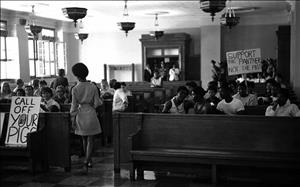On March 29, 1968, a large group of college and high-school students hold a sit-in at Seattle's Franklin High School to demand black administrators and teachers and the inclusion of African American history in the curriculum. Leaders of the demonstration, including University of Washington Black Student Union members Aaron Dixon and Larry Gossett, local SNCC (Student Non-Violent Coordinating Committee) head Carl Miller, and high-school student Trolice Flavors, will be charged with unlawful assembly.
In January 2002, the writer Thom Gunn interviewed Larry Gossett, now a King County councilman, and Aaron Dixon about the incident. Gunn writes:
"The cause of the incitement is still disputed, but Gossett says two girls had been sent home for wearing Afros. 'In the principal's note, he said they could come back when "they looked more ladylike" — in other words, when they looked more like white girls.'
'We zoomed down there,' Gossett recalls, and they met with the students at the Beanery, a campus hangout across from the school.
'The students were ready to tear the place apart,' Gossett remembers. 'Calm down,' we said. 'Why don't we have a sit-in and present our demands?'
The demands included a black administrator, a black teacher and some inclusion of blacks in American history ....
At 12:30, about 180 marched on the principal's office, chanting [Aaron] Dixon recalls, 'Ungowa, BLACK POWER!'"(Gunn).
Forbes Bottomly, Superintendent of Schools, agreed to the demands, and the protesters dispersed. However four days later, Seattle police arrested 16 of the identified leaders for "disorderly conduct." On June 13, 1968, Larry Gossett, Aaron Dixon, and Carl Miller were convicted of unlawful assembly for the March 29 sit-in. They were sentenced on July 1, in response to which riots broke out in the Central Area.
Their case eventually went to the Washington State Supreme Court, which reversed the decision of Superior Court Judge Solie Ringold, who had declared the unlawful assembly law unconstitutional. The Supreme Court reinstated the charges against Gossett, Dixon, and Miller. However, the prosecutor decided not to try the case again.

